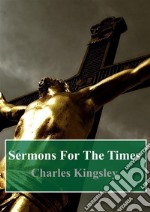The Ancien Régime. E-book. Formato PDF - 9788832575798
di Charles Kingsley
edito da IONLINESHOPPING.COM , 2019
Formato: PDF - Protezione: nessuna
Ancien Regime - As it existed on the continent before the French revolution is an unchanged, high-quality reprint of the original edition of 1867.
Preface
The rules of the Royal Institution forbid (and wisely) religious or political controversy. It was therefore impossible for me in these Lectures, to say much which had to be said, in drawing a just and complete picture of the Ancien Régime in France. The passages inserted between brackets, which bear on religious matters, were accordingly not spoken at the Royal Institution.
But more. It was impossible for me in these Lectures, to bring forward as fully as I could have wished, the contrast between the continental nations and England, whether now, or during the eighteenth century. But that contrast cannot be too carefully studied at the present moment. In proportion as it is seen and understood, will the fear of revolution (if such exists) die out among the wealthier classes; and the wish for it (if such exists) among the poorer; and a large extension of the suffrage will be looked on as—what it actually is—a safe and harmless concession to the wishes—and, as I hold, to the just rights—of large portion of the British nation.
There exists in Britain now, as far as I can see, no one of those evils which brought about the French Revolution. There is no widespread misery, and therefore no widespread discontent, among the classes who live by hand-labour. The legislation of the last generation has been steadily in favour of the poor, as against the rich; and it is even more true now than it was in 1789, that—as Arthur Young told the French mob which stopped his carriage—the rich pay many taxes (over and above the poor-rates, a direct tax on the capitalist in favour of the labourer) more than are paid by the poor. “In England” (says M. de Tocqueville of even the eighteenth century) “the poor man enjoyed the privilege of exemption from taxation; in France, the rich.” Equality before the law is as well-nigh complete as it can be, where some are rich and others poor; and the only privileged class, it sometimes seems to me, is the pauper, who has neither the responsibility of self-government, nor the toil of self-support.
The French Revolution, like every revolution (it seems to me) which has convulsed the nations of Europe for the last eighty years, was caused immediately—whatever may have been its more remote causes—by the suppression of thought; or, at least, by a sense of wrong among those who thought. A country where every man, be he fool or wise, is free to speak that which is in him, can never suffer a revolution. The folly blows itself off like steam, in harmless noise; the wisdom becomes part of the general intellectual stock of the nation, and prepares men for gradual, and therefore for harmless, change.
As long as the press is free, a nation is guaranteed against sudden and capricious folly, either from above or from below. As long as the press is free, a nation is guaranteed against the worse evil of persistent and obstinate folly, cloaking itself under the venerable shapes of tradition and authority. For under a free press, a nation must ultimately be guided not by a caste, not by a class, not by mere wealth, not by the passions of a mob: but by mind; by the net result of all the common-sense of its members; and in the present default of genius, which is un-common sense, common-sense seems to be the only, if not the best, safeguard for poor humanity.
Preface
The rules of the Royal Institution forbid (and wisely) religious or political controversy. It was therefore impossible for me in these Lectures, to say much which had to be said, in drawing a just and complete picture of the Ancien Régime in France. The passages inserted between brackets, which bear on religious matters, were accordingly not spoken at the Royal Institution.
But more. It was impossible for me in these Lectures, to bring forward as fully as I could have wished, the contrast between the continental nations and England, whether now, or during the eighteenth century. But that contrast cannot be too carefully studied at the present moment. In proportion as it is seen and understood, will the fear of revolution (if such exists) die out among the wealthier classes; and the wish for it (if such exists) among the poorer; and a large extension of the suffrage will be looked on as—what it actually is—a safe and harmless concession to the wishes—and, as I hold, to the just rights—of large portion of the British nation.
There exists in Britain now, as far as I can see, no one of those evils which brought about the French Revolution. There is no widespread misery, and therefore no widespread discontent, among the classes who live by hand-labour. The legislation of the last generation has been steadily in favour of the poor, as against the rich; and it is even more true now than it was in 1789, that—as Arthur Young told the French mob which stopped his carriage—the rich pay many taxes (over and above the poor-rates, a direct tax on the capitalist in favour of the labourer) more than are paid by the poor. “In England” (says M. de Tocqueville of even the eighteenth century) “the poor man enjoyed the privilege of exemption from taxation; in France, the rich.” Equality before the law is as well-nigh complete as it can be, where some are rich and others poor; and the only privileged class, it sometimes seems to me, is the pauper, who has neither the responsibility of self-government, nor the toil of self-support.
The French Revolution, like every revolution (it seems to me) which has convulsed the nations of Europe for the last eighty years, was caused immediately—whatever may have been its more remote causes—by the suppression of thought; or, at least, by a sense of wrong among those who thought. A country where every man, be he fool or wise, is free to speak that which is in him, can never suffer a revolution. The folly blows itself off like steam, in harmless noise; the wisdom becomes part of the general intellectual stock of the nation, and prepares men for gradual, and therefore for harmless, change.
As long as the press is free, a nation is guaranteed against sudden and capricious folly, either from above or from below. As long as the press is free, a nation is guaranteed against the worse evil of persistent and obstinate folly, cloaking itself under the venerable shapes of tradition and authority. For under a free press, a nation must ultimately be guided not by a caste, not by a class, not by mere wealth, not by the passions of a mob: but by mind; by the net result of all the common-sense of its members; and in the present default of genius, which is un-common sense, common-sense seems to be the only, if not the best, safeguard for poor humanity.
Ean
9788832575798
Titolo
The Ancien Régime. E-book. Formato PDF
Autore
Editore
Data Pubblicazione
2019
Formato
PDF
Protezione
nessuna
Punti Accumulabili





